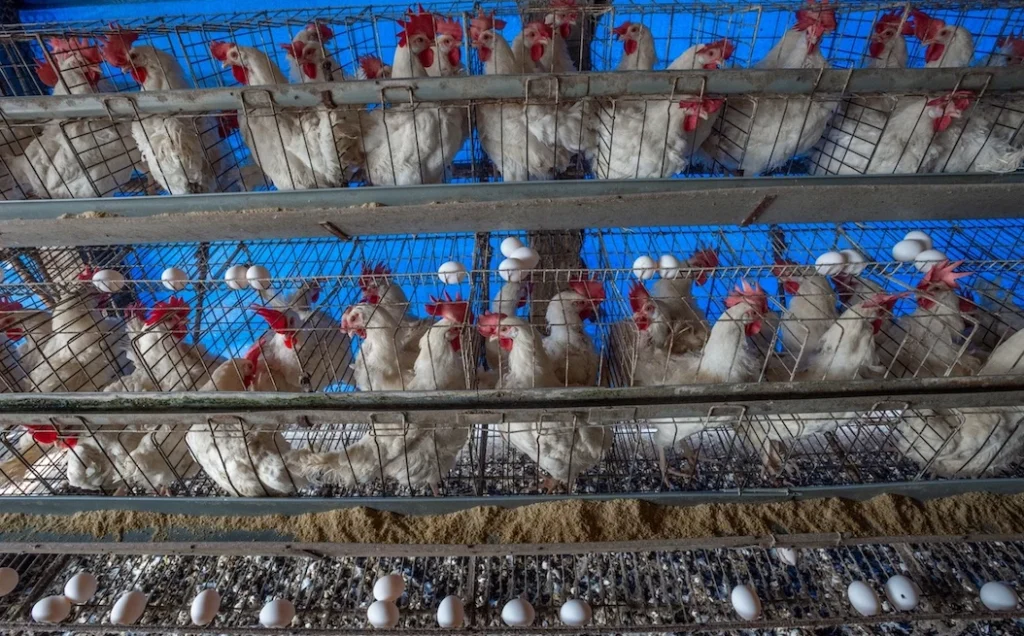Animal wellness groups say DOJ’s legal claims are “frivolous” and are not a close call for the courts, with the claim headed for defeat
WASHINGTON, D.C. — Animal Wellness Action (AWA) and the Center for a Humane Economy (CHE) called the U.S. Department of Justice’s lawsuit against the state of California “politically driven” and “a set of stink bombs tossed into bosom of America’s egg farms” after the farms have already had to deal with the chaos created by a three-year epidemic that has resulted in the depopulation of more than 130 million laying hens.

In its filing in a U.S. District Court in California, the Department of Justice argues that the state’s laws conflict with the provisions of the federal Egg Products Inspection Act and are therefore preempted. The lawsuit represents the latest in a long line of failed legal assaults, mainly by the pork industry and its surrogates, to overturn common-sense, immensely popular laws that give animals more space and promote safer food for consumers.
The pork industry has been on the losing end of 19 straight cases where it’s presented an array of legal theories to overturn state laws limiting extreme confinement of breeding sows in gestation crates. The U.S. Supreme Court, in NPPC v. Ross, said California’s Prop 12 was constructed in a fair-minded way and was a proper exercise of state authority on animal welfare and food safety. The Supreme Court, just two weeks ago, denied a writ of certiorari from the Iowa Pork Producers, denying the petitioners a second chance to make their arguments before the full panel of justices. The pork industry has, in parallel, been pleading with Congress to overturn these laws, but its past legislative maneuvers failed to gain traction on either the 2014 or 2018 Farm bills.
“The American egg industry has noticeably been absent from any of the pork industry’s legal challenges against California’s animal welfare laws, and the Trump Administration will not find major egg producers lining up behind them in this case,” said Wayne Pacelle, president of Animal Wellness Action and the Center for a Humane Economy. “With this ill-considered legal action, the Administration is dropping a set of stink bombs into the bosom of the egg industry. Just after the industry was turned inside-out by a still-running bird flu outbreak that resulted in the depopulation of 135 million laying hens, now it’s got to toss to disrupt the supply chain and provide an opening for egg farmers from Mexico — which have no animal welfare standards at all — to access the California market.”
The preemption argument is particularly baseless because Congress has had countless opportunities to establish minimal animal welfare standards for animals on farms, but it has been convinced by animal agriculture groups to do nothing legislatively on this front. “When it comes to federal animal welfare standards on the farm, there are no standards whatever, so the claim that state farm animal welfare laws are preempted is laughable on its face,”adds Pacelle, who was a key architect of Prop 2, Prop 12, and all other state ballot measures promoting farm animal welfare.
The Egg Products Inspection Act does not, in either its plain language or its intent, touch on the humane treatment of chickens, but rather is focused on consumer safety in a post-production environment. Research has shown that providing farm animals, including egg layers, with the minimal space requirements that the California law provides benefits food safety and consumer protection.
“The legal premise contained in DOJ’s lawsuit is so tenuous and unfounded that it borders on being frivolous,” said Scott Edwards, general counsel of Animal Wellness Action. “Time and again, the federal courts have rejected these industry-backed challenges, and this one will meet the same fate.”
The claim now being advanced by the Department of Justice was first attempted unsuccessfully by a coalition of six states in 2014. In that case, the Ninth Circuit Court of Appeals firmly rejected the effort to invalidate Proposition 2 on similar grounds, dismissing the case outright given the states’ lack of standing to bring the claims. Moreover, the DOJ’s action closely mirrors a recent preemption claim brought by the pork industry against Massachusetts’ Question 3 and its own anti-cruelty confinement measures under the Federal Meat Inspection Act—a case that was dismissed by the federal district court in Massachusetts. While that case is currently pending a decision on appeal, there is every indication that the First Circuit will uphold the lower court’s dismissal.
Propositions 2 and 12 were overwhelmingly approved by California voters and represent a powerful mandate for animal protection. Similar laws have since been enacted in multiple other states, including Colorado, Massachusetts, Michigan, Oregon, and Washington. These laws reflect evolving consumer values, as Americans increasingly demand higher welfare standards, including cage-free housing for egg-laying hens.
In 2010, just 4.4% of laying hens, or 12.2 million birds, lived in cage-free environments across the United States. Now that number is 45.7%, and the number of laying hens in cage-free environments exceeds 130 million. “There’s been 10X growth for cage-free production in the last 15 years because that’s what consumers and food retailers are increasingly demanding,” noted Pacelle. “The egg industry has responded and invested billions in more extensive housing systems. This lawsuit wants to send America back to the drawing board on farm animal welfare, causing harm to all key stakeholders, including the animals at the center of the business.”
“We fully expect the courts to rapidly dispose of the DOJ’s case, just as they have with other meritless lawsuits brought by the animal agriculture industry and its surrogates,” added Edwards. “At a time when the public is demanding more humane treatment of animals, it is deeply troubling that the DOJ is squandering taxpayer dollars to try to tear down a law that simply provides animals with space to stand up, turn around, and spread their wings.”
Photo credit: Laying Hens-Jo-anne-Mcarthur/weanimalsmedia.org

